| Srl | Item |
| 1 |
ID:
139442
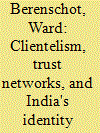

|
|
|
|
|
| Summary/Abstract |
With an election campaign for a seat in Gujarat's state parliament as its backdrop, this article relates India's persistent forms of identity politics to the evolution of trust networks. Political scientists and anthropologists have adopted highly divergent approaches to account for the ways in which India's politicians use social identities to mobilize support. A point of convergence, this article argues, lies in the social networks through which people solve everyday problems and organize access to state resources. Discussing the ever-changing salience of social divisions in Gujarat's politics – from class to caste to religion and region – this article argues that two characteristics of such trust networks – the extent to which these networks are organized along social divides and the extent to which they lend themselves to facilitating clientelistic exchanges with politicians – can foster or impede the political salience of these social divisions. The particular historical development of trust networks and their entanglement in patronage networks impacts the likelihood of the emergence of divisive political discourse.
|
|
|
|
|
|
|
|
|
|
|
|
|
|
|
|
| 2 |
ID:
186568
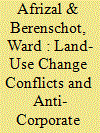

|
|
|
|
|
| Summary/Abstract |
While processes of land-use change have triggered conflicts across Asia, our knowledge of the responses of affected communities is largely based on case-studies. This review essay addresses this challenge by reviewing and synthesizing 49 studies of conflicts between rural communities and companies in order to identify salient characteristics of anti-corporate activism in Indonesia. We find that, in contrast to the ‘rightful resistance’ observed elsewhere, the strategies employed by rural communities in Indonesia are remarkably “rightless” as both their discourse and their conflict resolution efforts are marked by a remarkable irrelevance of laws, regulations and courts. Communities frame their claims mostly in terms of customary laws while largely relying on informal mediation by local authorities. We attribute this “rightless” character of land-use change conflicts to the weak legal protection of land rights in Indonesia and the relative powerlessness of communities in the face of collusion between authorities and companies.
|
|
|
|
|
|
|
|
|
|
|
|
|
|
|
|
| 3 |
ID:
105907
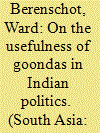

|
|
|
|
|
| Publication |
2011.
|
| Summary/Abstract |
This article discusses the cooperation between small-time criminals (or goondas) and politicians in a locality in Ahmedabad, Gujarat (India). Based on an ethnographic study of local political networks, this article argues that the regular co-operation between politicians and goondas is a product of the inaccessibility of the Indian state to its poorer citizens. The 'criminalisation of politics' is not a sign of moral decay, but a product of the difficulties of (poorer) citizens in dealing with state institutions and the specific nature of the local political competition that these difficulties engender. As local politicians need to develop their capacity to 'get things done' for voters, they need both the 'moneypower' and 'musclepower' of goondas to settle local issues, enforce their authority and manipulate voting.
|
|
|
|
|
|
|
|
|
|
|
|
|
|
|
|
| 4 |
ID:
170812
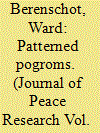

|
|
|
|
|
| Summary/Abstract |
The regular occurrence of election-related violence between ethnic or religious communities has generated a burgeoning literature on ‘the dark side’ of democracy. This literature provides convincing accounts of how political competition incentivizes politicians to foment violence. Yet such elite-oriented approaches are less convincing in explaining why and how political elites succeed in mobilizing people who do not share their concern for electoral benefits. This article addresses this challenge by relating the capacity of politicians to foment violence to the everyday functioning of patronage networks. Using ethnographic fieldwork to compare violent and nonviolent areas during Hindu–Muslim violence in Gujarat (2002) and Christian–Muslim violence in North Maluku (1999–2000), I find that the informal networks through which citizens gain access to state benefits (‘patronage networks’) shape patterns of election-related violence between religious communities. Politicians succeeded in fomenting violence in areas where citizens depended strongly on ethnicized patronage networks, while violence was averted in areas where state–citizen interaction was organized through networks that bridge religious divides. Interpreting this finding, I argue that patronage networks generate both infrastructure and incentives to organize violence. They provide the infrastructure for violence because their everyday functioning generates interdependencies between politicians and local followers that facilitate the instigation and organization of violence. Patronage networks also generate incentives for violence because when prevailing patronage networks bridge social divides, politicians relying on these networks have an interest in preventing communal violence. When socio-economic changes cause patronage networks to become organized along religious divides, as occurred in the violent areas in Gujarat and North Maluku, divisive political discourse is more likely to resonate and political actors are more likely to benefit electorally from communal violence. In this manner this article provides a novel explanation for both subnational variation in patterns of violence and the hardening of social divisions.
|
|
|
|
|
|
|
|
|
|
|
|
|
|
|
|
| 5 |
ID:
108990
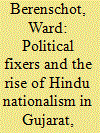

|
|
|
|
|
| Publication |
2011.
|
| Summary/Abstract |
Political fixers are intermediaries who use political contacts and knowledge of official procedures to facilitate the interaction between citizens and state institutions. Fixers have become a prominent feature of India's democracy as facilitators of clientelistic exchanges between voters and politicians. Through a discussion of the functioning of political fixers in Gujarat's main city, Ahmedabad, this article argues that changes in voting behaviour can be explained by looking at (changes in) the way political fixers provide access to state resources. I argue that Hindu nationalist organisations managed to gain popularity among backward castes in Gujarat because of the dependence of these communities on political fixers. As the networks of older political fixers collapsed, Hindu nationalist organisations could win a local following by offering political fixers from backward castes new channels to access state resources.
|
|
|
|
|
|
|
|
|
|
|
|
|
|
|
|
| 6 |
ID:
178634
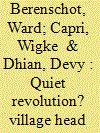

|
|
|
|
|
| Summary/Abstract |
While democratization is regularly associated with elite renewal, established elites often succeed in maintaining their dominance after the fall of the authoritarian regime that fostered them. This constitutes a relatively understudied challenge facing democratization processes: when and how do democratic reforms succeed in fostering the emergence of new elites? This paper addresses this question through a study of village head elections in three rural districts around Yogyakarta, Indonesia. Comparing older studies of village head elections with ten in-depth studies of recent village head elections as well as assessments of the backgrounds of eighty village heads (kepala desa), this paper shows that a remarkable change has taken place. Whereas up to ten years ago many villages were still ruled by leaders from established families with a quasi-hereditary grip on power, in recent years such leaders are rapidly being replaced by village heads with more modest family backgrounds and a different style of leadership. This important change has resulted from a combination of democratic reforms, the diversification of rural economies, and the particularly competitive character of village head elections. Elite renewal is possible when open and information-dense elections coincide with a process of economic diversification undercutting the economic dominance of established elites.
|
|
|
|
|
|
|
|
|
|
|
|
|
|
|
|
| 7 |
ID:
103125
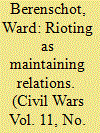

|
|
|
|
|
| Publication |
2009.
|
| Summary/Abstract |
This article discusses the role that local politicians played during the 2002 Hindu-Muslim violence in Gujarat, India. I argue that the capacity and interests of political actors to instigate and organise communal rioting is closely related to their capacity to provide access to state resources. The cooperation during the riots between politicians and various types of rioters - from local criminals, Hindu-nationalist activists, neighbourhood leaders to police officials - can be understood in the light of the daily functioning of the local patronage networks that help citizens deal with state institutions.
|
|
|
|
|
|
|
|
|
|
|
|
|
|
|
|